
Pulp are an English rock band formed in Sheffield in 1978. Their best-known line-up from their heyday (1992–1997) consisted of Jarvis Cocker, Russell Senior, Candida Doyle (keyboards), Nick Banks, Steve Mackey (bass) and Mark Webber.
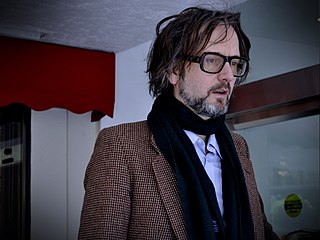
Jarvis Branson Cocker is an English musician and radio presenter. As the founder, frontman, lyricist and only consistent member of the band Pulp, he became a figurehead of the Britpop genre of the mid-1990s. Following Pulp's hiatus, Cocker has pursued a solo career, and for seven years he presented the BBC Radio 6 Music show Jarvis Cocker's Sunday Service.

We Love Life is the seventh and final studio album by English rock band Pulp, released on 22 October 2001 by Island Records. It reached number six on the UK Albums Chart, with a total chart stay of only three weeks. Written and recorded after the tumultuous sessions for This Is Hardcore, We Love Life saw the band move toward a more relaxed and natural sound, shepherded by producer Scott Walker. Walker had replaced original producer Chris Thomas, whom the band had worked with on previous albums.

"Common People" is a song by English alternative rock band Pulp, released in May 1995 as the lead single from their fifth studio album Different Class. It reached No. 2 in the UK Singles Chart, becoming a defining track of the Britpop movement as well as Pulp's signature song. In 2014, BBC Radio 6 Music listeners voted it their favourite Britpop song in an online poll. In a 2015 Rolling Stone readers' poll it was voted the greatest Britpop song.
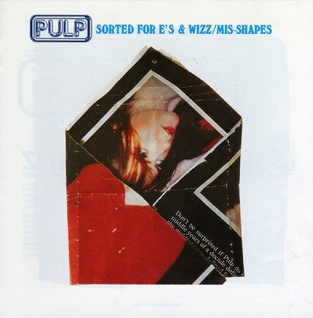
"Sorted for E's & Wizz" is a song written and performed by the English band Pulp for their 1995 album Different Class. Based lyrically on a phrase that lead singer Jarvis Cocker overheard at a rave, the song features lyrics examining the hollow and artificial nature of drug culture. Because of its subject matter, the song sparked controversy in the UK, where several tabloids attacked the song.

Stephen Patrick Mackey was an English musician and record producer best known as the bass guitarist for the alternative rock band Pulp, which he joined in 1989. As a record producer, he produced songs and albums by M.I.A., Florence + the Machine, The Long Blondes and Arcade Fire.

"Help the Aged" is a song by British alternative rock band Pulp from their 1998 album, This Is Hardcore. Written as a sarcastic reflection of Pulp singer Jarvis Cocker's ageing, the song was disliked by Pulp guitarist Russell Senior who left the band before the song's release and sought to prevent it from being released as a single.

"This Is Hardcore" is a song by English rock band Pulp, released as the second single from their sixth album, This Is Hardcore (1998). Written as a commentary on fame using pornography as an analogy, the song includes a sample of the Peter Thomas Sound Orchestra's "Bolero on the Moon Rocks." Released as a single in March 1998, the song reached number 12 in the UK and became a top-40 hit in Finland, Iceland, and New Zealand. It has since seen critical acclaim, as has its music video.

"Mis-Shapes" is a song written and released by Sheffield band Pulp from their 1995 album Different Class. Lyrically inspired by Cocker's experiences socializing in Sheffield as an outcast, the song features lyrics that call for misfits to unite and take over. This lyrical theme would make Cocker uncomfortable with Pulp's growing popularity with "townies" after the song's release.

"Something Changed" is a song by Britpop band Pulp, released on their 1995 album, Different Class. Written much earlier in the band's existence but revived for the Different Class sessions, "Something Changed" features lyrics that focused on the random nature as to how important events happen in life. The song also features a guitar solo performed by guitarist Mark Webber.

The Peel Sessions is a double live album by Pulp released on 23 October 2006, containing the recordings the band made for John Peel's Radio 1 show and live performances which had been broadcast by the BBC.
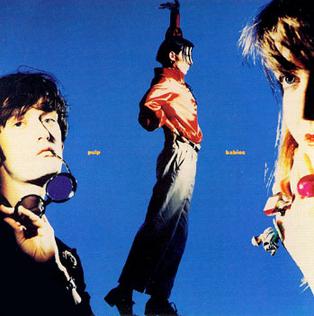
"Babies" is a song written and released by British rock group Pulp. Featuring lyrics about a boy spying on his friend's sister from a wardrobe, the song features a guitar riff that drummer Nick Banks had played for Pulp frontman Jarvis Cocker. Though poppier and lighter than much of the band's earlier material, the band was pleased with the song and was released as a single.

"Do You Remember the First Time?" is a song by British rock band Pulp, taken from their fourth studio album, His 'n' Hers (1994). With lyrics loosely based on Pulp frontman Jarvis Cocker's loss of virginity, the song saw some controversy for its sexual topic. Released as the second single from His 'n' Hers, the song reached number 33 in the UK, becoming the band's first top-40 hit in that country. The single was accompanied by a lengthy music video featuring celebrities discussing how they lost their virginity. The song has since become one of the band's most famous songs and has seen critical acclaim. The track also notably served as the band's opening song on their reunion tour setlist.
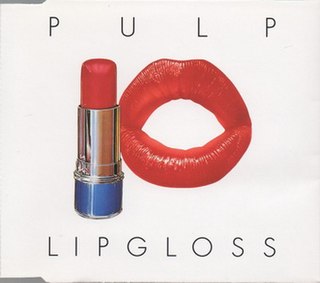
"Lipgloss" is a song by British rock band Pulp from their 1994 album, His 'n' Hers. With lyrics written by Pulp frontman Jarvis Cocker about the deterioration of social skills that comes with a relationship in the context of a breakup, the song was the first that the band worked on for their new record company, Island Records.

"Razzmatazz" is a song written and released by the British rock group Pulp. Featuring lyrics written by Pulp frontman Jarvis Cocker about an ex-girlfriend, the song sees the narrator mock his ex-girlfriend for leading a dull life after dumping him.

"Party Hard" is a song by British alternative rock band Pulp. Featuring David Bowie-inspired vocals, the song lyrically was inspired by the band's dissatisfaction and exhaustion with clubbing.

"Bad Cover Version" is a song by British rock band Pulp, from their 2001 album We Love Life. It was released 15 April 2002 as the second single from the album, charting at number 27 in the UK Singles Chart. It was the band's last single before their eight-year hiatus, which ended in 2011. CD1's B-sides appear as bonus tracks on the US release of We Love Life. The B-sides to CD2 are cover versions of Pulp songs performed by other artists.

"Disco 2000" is a song by British band Pulp, released on the band's 1995 album, Different Class. Featuring a disco-inspired musical performance, the song was based on Pulp singer Jarvis Cocker's childhood memories of his friend Deborah Bone, who he had "fancied" in his youth but could never impress.

"Sunrise" is a song by British rock band Pulp, from their 2001 album We Love Life. It was released as a double-A single with "The Trees" on 8 October 2001 ahead of the album, charting at #23 in the UK Singles Chart. "Sunrise" is also used in the award-winning BBC animated satirical comedy sketch show Monkey Dust.
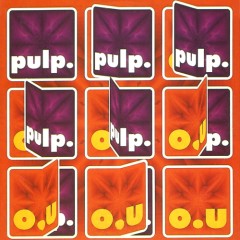
"O.U. " is a song written and released by British pop band Pulp in 1992. Recorded with producer and former Pulp member Simon Hinkler, "O.U." would be the band's first single with Gift Records, with whom the band signed after conflicting with indie label Fire.



















